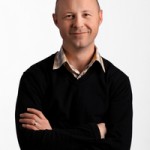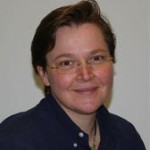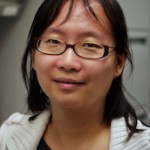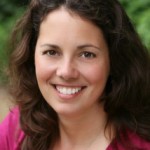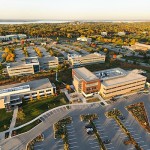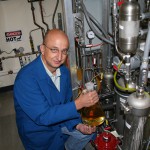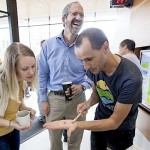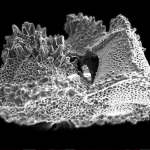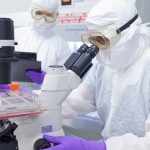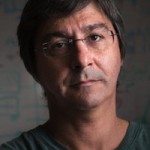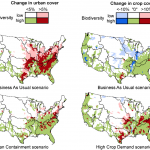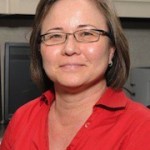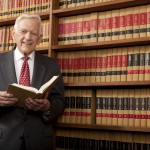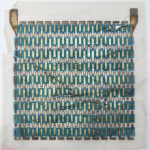Category Science & Technology
New look identifies crucial clumping of diabetes-causing proteins
People get type 2 diabetes. So do cats. But rats don’t, and neither do dogs. Subtle differences in the shape of proteins protect some and endanger others.
Vet med scientists find better, safer treatments for hoof disease in cattle
For almost 40 years, digital dermatitis has plagued cattle throughout the world. Also called heel warts, these painful hoof lesions limit the amount of time cows can stand and feed, which can hinder animal welfare and food production. The disease can be found on almost every beef and dairy farm in North America, so it has a significant economic impact on those industries in the United States.
Discovery sheds light on how changes in lungs can hurt the heart
A team of University of Wisconsin–Madison researchers has discovered important biomechanical changes in human arteries that could increase understanding of how pulmonary hypertension leads to heart failure.
Science writer in residence visiting campus week of Nov. 11
Siri Carpenter, a senior editor at the popular science magazine Discover, will visit the University of Wisconsin–Madison as Science Writer in Residence Nov. 11-15.
Hyer assumes leadership as University Research Park continues to grow
With last Friday's retirement of longtime University Research Park Director Mark Bugher, associate director Greg Hyer is assuming the role of interim director of the successful, 260-acre park on the West Side of Madison.
Model virus structure shows why there’s no cure for common cold
In a pair of landmark studies that exploit the genetic sequencing of the “missing link” cold virus, rhinovirus C, scientists at the University of Wisconsin–Madison have constructed a three-dimensional model of the pathogen that shows why there is no cure yet for the common cold.
Study challenges prevailing view of invasive species
Zebra mussels. Asian carp. Kudzu. Chances are you recognize these names as belonging to invasive species - plants or animals that are relocated from their native habitat to a foreign land, only to prove so prolific that they take over their new home. Except that's not how the story usually goes, according to a new study.
H5N1 bird flu genes show nature can pick worrisome traits
In a study published today (Oct. 23, 2013) in Nature Communications, an international team of researchers shows how evolution can favor mutations that make avian flu more transmissible in mammals.
Teatime becoming an institution at institutes
For David Krakauer, a cup of tea has long been as much a part of the research process as beakers, computers and lab benches.
Hitchhiking virus confirms saga of ancient human migration
A study of the full genetic code of a common human virus offers a dramatic confirmation of the "out-of-Africa" pattern of human migration, which had previously been documented by anthropologists and studies of the human genome.
WARF Innovation Award winners offer a better oat, infection disrupter
A new oat offering tasty ways to lower cholesterol and compounds capable of disrupting serious bacterial infections earned top honors in this year's Wisconsin Alumni Research Foundation Innovation Awards program.
New techniques sharpen climate record found in fossil shells
Locked inside the fossil shells of a marine plankton are the secrets of past climate.
Biomanufacturing center takes central role in developing stem-cell therapies
Developing a new drug takes enormous amounts of time, money and skill, but the bar is even higher for a promising stem-cell therapy. Many types of cells derived from these ultra-flexible parent cells are moving toward the market, but the very quality that makes stem cells so valuable also makes them a difficult source of therapeutics.
Target of animal rights protests kicks off animal research ethics forum
Any research that includes animals presents ethical questions, but they are questions Dario Ringach believes we rarely address together.
Study puts freshwater biodiversity on the map
When it comes to economic growth and environmental impacts, it can seem like Newton's third law of motion is the rule - for every action, there is an equal and opposite reaction - and that in most cases, the economy prospers and the environment suffers.
The sun also flips: 11-year solar cycle wimpy, but peaking
In a 3-meter diameter hollow aluminum sphere, Cary Forest, a University of Wisconsin–Madison physics professor, is stirring and heating plasmas to 500,000 degrees Fahrenheit to experimentally mimic the magnetic field-inducing cosmic dynamos at the heart of planets, stars and other celestial bodies.
WARF’s Bremer remembered as technology transfer legend
Sustained by a passion to improve people's lives, Howard Bremer's enduring commitment to innovation fueled his work and his life. Bremer, 90, a WWII U.S. Navy veteran and patent attorney with degrees in law and chemical engineering from the University of Wisconsin–Madison passed away Friday, ending a remarkable career at the Wisconsin Alumni Research Foundation that spanned 53 years.
The chemistry of color: Energy researcher develops dye-based solar cells
University of Wisconsin–Madison researchers working at the intersection of basic and applied science focus on key factors like cost, environmental impacts ... and sometimes, color.

